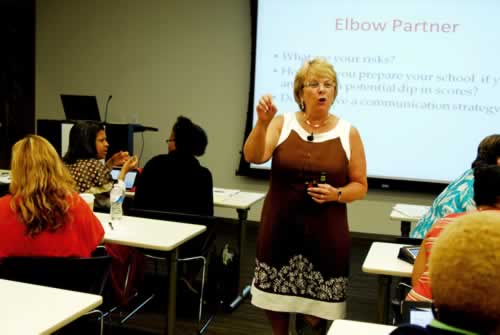Council of School Supervisors Helps Professional Development
By Yuridia Peña

Susan A. Gendron conducts a lecture on how NYC administrators can implement the common core standards effectively.
Creating a school model grounded on rigor, relevance and relationships with students were the focal points Susan A. Gendron addressed during her lecture to school administrators, called “Getting Immersed in the Standards and Next Generation Assessments.” The Council of School Supervisors and Administrator’s professional development arm, the Executive Leadership Institute, hosted the event at their headquarters in Lower Manhattan.
Training educators how to align their school’s curriculum with the national common core standards is challenging. However, Gendron’s easy-to-digest presentation left many principals, assistant principals, as well as other school leaders at ease and confident about new assessments that many perceive as burdensome.
“This is good for me … because I’m getting itsy bits of pieces from the central office,” said John Tom, an education administrator who helps develop science curriculum for middle schools.
During her presentation, Gendron defined rigor as a factor that requires fluency, application and a deep understanding. This includes conceptual understanding, which she explained as solving short conceptual problems or applying math in new situations. Rigor encompasses procedural skills and requires speed as well as accuracy. She also suggested implementing real-world situations as a strategy for applying rigor in the classroom.
Gendron adopted the rigor and relevance model from Dr. Bill Daggett, a widely known expert on creating curriculum that works for the modern-day student. His framework focuses on lessons bearing in mind college and career readiness for all students. The Daggett system for effective instruction promises to reach high levels of student achievement using its three factors — organizational leadership, instructional leadership and teaching. Many schools around the U.S. use this system as a foundation.
According to the 2009 Programme for International Student Assessment (PISA) results, the U.S. ranked 17th in the world in reading and 31 in mathematics. “We are significantly below average,” Gendron said.
Gendron was stunned to see avid Principals, Assistant Principals and Education Administrators at the summer professional development event. “We are in July, in the middle of the summer and they were all engaged, they all wanted to learn, they were excited, they asked great questions,” she said.
Participants received a detailed update on The Partnership for Assessment of Readiness for College and Careers (PARCC). PARCC is the assessment consortium New York belongs to along with 21 other states and the District of Columbia. The partnership was created to help states work together to develop a set of K-12 assessments in English and math that builds a pathway to college and career readiness. A $186 million grant was granted to PARCC through the U.S. Department of Education’s Race to the Top competition to support next-generation assessment systems. PARCC creates high-quality assessments that measure the full range of the common core state standards. PARCC has yet to release its assessment items.
Gendron is the policy coordinator for Smarter Balanced, another assessment consortium that educates approximately 22 million public school students. Synonymous to PARCC, member states develop an assessment system aligned to the common core state standards.
“I was really interested about finding out about PARRC and the rigor that students will need in order to be successful,” said Marie Busiello, an education administrator.
Susan A. Gendron gained recognition as an educator in Maine, where she encouraged the expansion of public preschool programs and moved schools to a learner-centered system of standards-based education. Today, she helps school administrators implement the common core state standards effectively, create a culture of collaboration among teachers and stay abreast about state and national assessments. #
